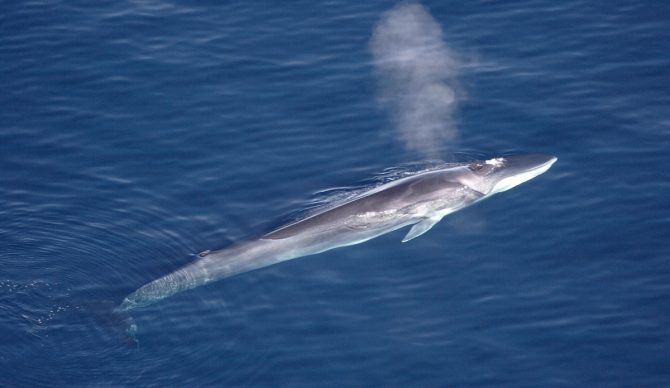
Fin whales aren’t on Iceland’s kill list anymore… at least for now. Photo: Wikimedia Commons
Whaling isn’t exactly popular anymore. Despite the outcry from much of the rest of the world, a handful of countries still do it. But one of those countries just announced they’d be suspending its 2023 hunt, and it’s unlikely that it will resume in 2024. Bravo, Iceland.
Back in the day, we hunted all sorts of whales almost to extinction. Whale meat and blubber helped the indigenous people of Greenland and the Eskimos to get through long, cold winters. Whale meat is full of vitamins A, C, and D, and it’s rich in niacin, iron, and protein. The stuff early man didn’t use for sustenance was used for lamp oil, tools, clothing, and sleds, so nothing went unused. In Japan, whaling is steeped in history. During the second World War, whale meat was one of the most important parts of their food supply. Whalers all over the world hunted whales for their oil, too, because it was, for a while at least, used in lamps, candles, and even in margarine and vehicle fluids like motor oil. The cosmetic industry used it too, and the commercial whaling industry blew up. But then, since we’re a short-sighted species, we pretty much killed most of them in the throes of a killing spree. Classic humans.
Over the following years, more and more people realized the reality of what we were doing to a creature that is clearly very intelligent. We became aghast at the reality of what we were doing, and in 1986, the International Whaling Commission (IWC) enacted a global moratorium on commercial whaling. While most countries happily signed on, a few did not: Norway, Japan, and Iceland.
See, the IWC’s power isn’t formal. No country is required by law to follow its rules. It’s voluntary, but like tipping in the States, it’s just kind of… expected. You won’t get kicked out of a restaurant for not tipping, but you sure look like a jerk if you don’t do it. So Iceland, Norway, and Japan just kept on killing whales despite the backlash from the rest of the world. Now, though, Iceland is realizing how pointless, cruel, and unnecessary it is.
The suspension was officially announced on June 20 by Iceland’s Minister of Food, Agriculture, and Fisheries after reviewing Iceland’s Act on Animal Welfare. “In my opinion, the conditions of the Act on Animal Welfare are mandatory,” said Iceland’s Minister of Food, Agriculture, and Fisheries, Svandís Svavarsdóttir. “This activity cannot continue in the future if the authorities and the license holders can not ensure the fulfillment of the welfare requirements.”
The ban applies to fin whales and is in place until August 31, which is pretty much the entire Icelandic whaling season. It’s likely, however, that the temporary suspension will be extended to a more permanent basis.
Whaling is not a quick or painless death. Many Icelandic whalers use explosive harpoons, which lodge into the whale’s blubber before exploding. In a study of 58 of the 148 whales caught in Iceland last year, they found the average time it took to die was almost 12 minutes. At least two of the whales lived for more than two hours.
Aside from the awfulness of hunting whales for the sake of some forgotten traditions, the demand for whale products has plummeted. “Amid declining domestic demand for whale meat,” wrote Tom Hale for IFLScience, “Minister Svavarsdóttir explained in early 2022 that it would be very unlikely that whaling licenses will be renewed in Iceland when they expire at the end of 2023, effectively ending the practice by 2024.”
Now, it’s just Japan and Norway that still hunt whales. And with any luck, they’ll follow the lead of the rest of the world and ban it too.
“The world,” said Kitty Block, CEO of Humane Society International, “now looks at Japan and Norway as the only two countries in the world to still mercilessly kill whales for profit.”

